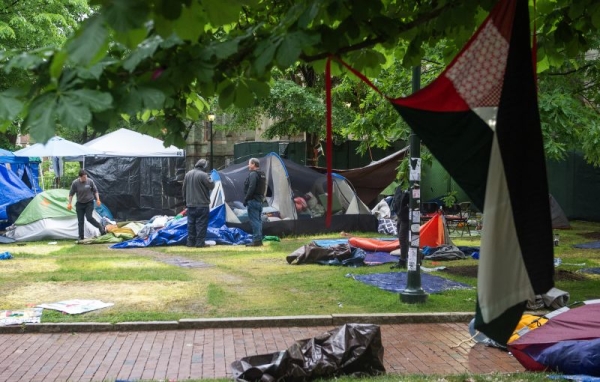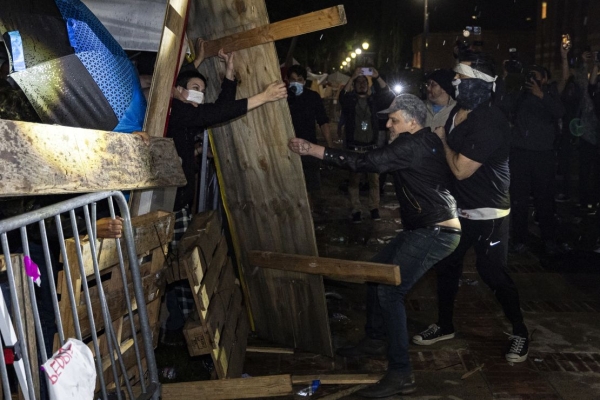
Universities across the United States have adopted a number of tactics in recent weeks to prevent disruptions by pro-Palestinian protesters at graduation ceremonies. Some universities have reached agreements with on-campus demonstrators, while others have cited safety concerns and canceled, postponed or relocated their schoolwide ceremonies.
Several schools continue to grapple with pro-Palestinian protesters ahead of their spring commencement, subjecting themselves to internal scrutiny and public criticism.
Protesters arrested at UPenn
On Friday night, University of Pennsylvania police arrested 19 individuals, including seven students, following an attempt by pro-Palestinian demonstrators to occupy a university building, a university spokesperson told CNN Saturday.
Penn Against the Occupation announced their intention to occupy Fisher-Bennet Hall in a post on the group’s Instagram Friday night, calling for people to “flood UPenn for Palestine.”
The group called on the school’s administration, in part, to divest from corporations “that profit from Israel’s war on Gaza and occupation in Palestine and academically from Israel institutions, condemning the scholasticide of Palestinian scholars and universities,” according to another Instagram post.
Friday’s arrests follow the arrest of at least 33 people on May 10 when law enforcement broke down a pro-Palestinian encampment erected on campus.
The latest campus arrests also come just a few days before Monday’s universitywide commencement ceremony, where students and their families will be subject to additional safety procedures described as “airport-style security screening,” the university said in a safety update earlier this month.
Guests and graduates will not be allowed to bring signs, posters, flags and artificial noisemakers, according to school officials.
UCLA and Sonoma State face internal division
On Thursday, the Academic Senate at the University of California, Los Angeles rejected resolutions of no confidence and censure brought against Gene Block, the school’s chancellor.
The resolutions were brought forward in the wake of an attack by counterprotesters on an on-campus pro-Palestinian encampment on April 30, and claimed Block “failed to ensure the safety of our students and grievously mishandled” the situation.
The no-confidence resolution failed after only 43% of members voted in its favor. The resolution to censure failed to get the majority of votes required to pass by the senate. In all, 88 members voted in favor of the censure, while 88 opposed it, three abstained and 15 were present but didn’t vote.
“It is clear that we are not united in how we view the major events of the past weeks and the campus response to them,” Chair Andrea M. Kasko said Friday in a statement. “I hope that we can try to find common ground as colleagues, and have the courage to listen with open minds and open hearts even when we do not agree.”

Counterprotesters attack a pro-Palestinian encampment set up on the campus of the University of California Los Angeles on May 1, 2024. Etienne Laurent/AFP/Getty Images
Also Friday, Mildred García, the chancellor of the California State University System, announced Sonoma State University President Mike Lee would be stepping down after he sent a message “concerning an agreement with campus protesters … sent without the appropriate approvals.”
The statement sent by Lee to the Sonoma State campus community on Tuesday included agreements to set up an advisory council of Students for Justice in Palestine as well as a review of the university’s vendor contracts and investments, according to a copy of the message obtained by CNN.
“SSU will not pursue or engage in any study abroad programs, faculty exchanges, or other formal collaborations that are sponsored by, or represent, the Israeli state academic and research institutions,” Lee wrote, adding study abroad programs in Israel will be “terminated until further notice.”
On Wednesday, García announced Lee had been placed on administrative leave for “insubordination.”
Morehouse threatens to shut down ceremony ‘on the spot’
In Atlanta, Morehouse College President David A. Thomas said he would shut down Sunday’s commencement ceremonies “on the spot” rather than allow police to remove student protesters during President Joe Biden’s highly anticipated graduation speech.
“What we won’t allow is disruptive behavior that prevents the ceremony or services from proceeding in a manner that those in attendance can partake and enjoy,” Thomas told CNN’s Victor Blackwell in an interview Thursday.
“So, for example, prolonged shouting down of the president as he speaks. I have also made a decision that we will also not ask police to take individuals out of commencement in zip ties. If faced with the choice, I will cease the ceremonies on the spot If we were to reach that position.”
Biden’s presence at Morehouse, one of the nation’s preeminent historically Black colleges, comes as the president campaigns amid weak polling among young voters, even as many have expressed frustration with his administration’s continued support of Israel’s military campaign in Gaza.
Biden has been confronted by some protests during his own speeches and campaign events. On January 23, his campaign speech on abortion rights at George Mason University in Virginia was interrupted more than a dozen times over his administration’s support of Israel.
Biden is expected to deliver a commencement address at the United States Military Academy at West Point on May 25.
CNN’s Danny Freeman, Paradise Afshar and Victor Blackwell contributed to this reporting.

